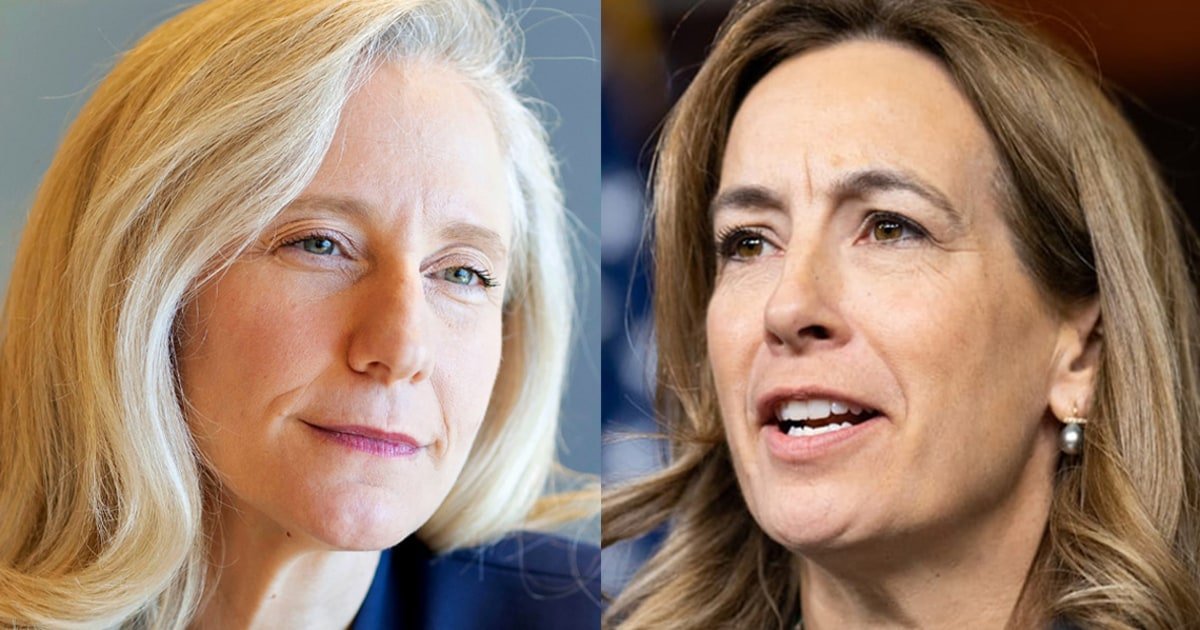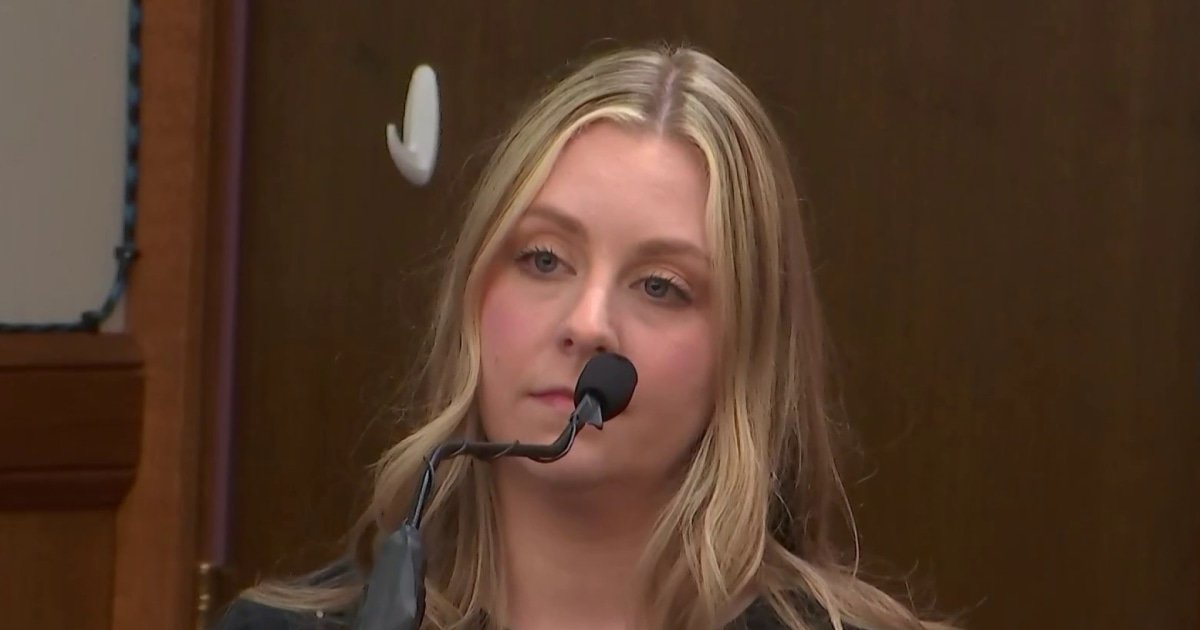For Democrats like Leslie Frucht, President Donald Trump’s 2024 victory was downright demoralizing. But she still felt compelled to demonstrate in Paramus, New Jersey, on a recent Saturday, in support of her party’s gubernatorial candidate, Rep. Mikie Sherrill.
“We have to do something and you have to feel part of the fight,” Frucht said.
Democrats hope this year’s gubernatorial elections in New Jersey and Virginia will energize their supporters not only in those states, but across the country as they look to overcome a brutal 2024 campaign cycle in which they lost the White House and the Senate, and as polls show, the party remains widely unpopular.
“Winning cures a lot of ills, right? It shows people that we’re back to normal,” Democratic National Committee Chairman Ken Martin told NBC News while knocking on doors earlier this month in Medford, New Jersey.
“But we’ve been winning,” Martin added, pointing to the party’s superior performance in this year’s special legislative elections, noting that each victory is “another shot in the arm for Democrats to give them the feeling that we have a plan, we know what we’re doing, we’re back and we’re going to win in the 26th and then again in the 28th.”
National Democrats have seen the races in New Jersey and Virginia as a key test of their message on economic issues, a point of emphasis that voters said was sorely lacking in the party last year.
Sherrill and Spanberger have done just that: develop campaigns focused on reducing the cost of living.
But both have faced a delicate balancing act on a host of other hot-button issues that have given the Democratic Party attacks in recent election cycles, including transgender rights and immigration.
With the election just days away, polls show Spanberger with a steady lead in Virginia over Republican Lt. Gov. Winsome Earle-Sears, while polls show the race in New Jersey between Sherrill and Republican Jack Ciattarelli remains close.
But if Spanberger and Sherrill emerge victorious in blue-leaning states, Democratic operatives are sure to seek to emulate the approach both candidates took in crafting a message for many of the party’s candidates in the 2026 midterm elections.
“If we have victories in both states, that will propel us to the 26th and hopefully create a shock wave where we can take back both the House and the Senate,” Martin said.
Focused on costs
In more than two dozen interviews with NBC News, Democratic officials, officials, candidates, operatives and voters said an important lesson from this year’s campaigns is how Spanberger and Sherill have focused on the issue of affordability.
Sherrill herself said this is an important takeaway from her campaign.
“I’m obviously focused on what we can do here in New Jersey in terms of costs, affordability, utility costs, health care costs, housing costs,” Sherrill said after the Paramus rally about his message to other Democrats watching his race. “But what I hear from my colleagues in the House of Representatives is that their constituents are asking the same thing: How can we reduce costs?”
Sherrill promised in his closing television announcement to “reduce costs.” He also highlighted his “day one” plan to address rising electricity costs by declaring a state of emergency on utility prices.
In Virginia, Spanberger has remained focused on a message that has emphasized plans to reduce health care and prescription drug costs, housing and energy, while criticizing Trump for wreaking havoc on the state’s economy. Much of that angle had been tied to Trump’s efforts to reduce the federal workforce early in his second term (many federal employees reside in Virginia) and she has used the current government shutdown to reinforce the focus.
In an interview with NBC News after a recent campaign event at a peanut farm in Franklin, Virginia, Spanberger said his message on the economy was a product of what he was hearing from voters.
“It’s a question of what people bring to me, which is the concern about affordability, the ability to know that your children can have the opportunity that you want for them,” he said. “It’s rising energy, healthcare and housing costs.”
Democratic strategists said the overall emphasis on economic issues has offered a stark contrast to the party’s messaging throughout last year’s elections.
“After 2024, we know we need to focus on the kitchen table. [issues]. Spanberger and Sherrill have shown that voters respond when we do that,” said Jesse Ferguson, a Democratic strategist and campaign veteran in Virginia.
In an interview after a recent Spanberger campaign event, Pennsylvania Gov. Josh Shapiro, a potential 2028 Democratic presidential candidate, praised Sherrill and Spanberger for “engaging in their races on issues like affordability and freedom” and suggested that anything that contributes to a winning message should be part of future campaigns.
“The party needs to move in the direction of winning races again after losing the presidential race and many races associated with that last cycle,” Shapiro said. “The direction our party needs to take is to win again and focus on finding answers and solutions to the pressing problems of the people in the states.”
thorny issues
Spanberger and Sherrill have also been tackling issues that have tripped up other Democrats: transgender rights and immigration.
Spanberger has faced criticism from Republicans for failing to take clear positions on transgender people’s participation in youth sports and the use of school locker rooms and public bathrooms. The themes were part of a broader education-focused message that Republican Virginia Gov. Glenn Youngkin used on his path to victory four years ago, and were again employed by Trump’s successful 2024 campaign.
Earle-Sears tried to revive that strategy, running ads that mimicked a Trump campaign ad last year in which a narrator says “Spanberger is for them, not us.”
Spanberger struggled to find a consistent and concise answer throughout the campaign, but eventually began to explain his position by saying that he felt it was important that such issues be left to parents, teachers and administrators, not the governor. It’s a response that has largely avoided the emerging debate within the Democratic Party on the issue.
But Democratic voters and strategists said Spanberger has been able to get away with not addressing the issue more directly because he has established a clear message about the economy, which polls have shown is a more important issue than trans rights this cycle.
“It doesn’t have the same resonance as before because ultimately the argument was about priorities,” Ferguson said of the GOP’s attacks related to trans people. “Voters are seeing that this time the GOP is obsessed with the ‘them/them’ issue, while the Democrats are the ones focused on the kitchen table, aka ‘you.’”
Gene Granger, a 43-year-old Portsmouth man who describes himself as an independent and supports Spanberger, said the Democrat’s approaches to trans issues “have been good.”
“Who the hell cares? We should be talking about the economy, jobs, prosperity, how we’re going to improve Virginia, not whether or not someone is a man or a girl,” Granger said after a recent Spanberger campaign event.
Spanberger has also circled around the issue of Democratic attorney general candidate Jay Jones’ past violent text messages that were discovered earlier this month. She has condemned the text messages but has not withdrawn her support or asked him to drop out of the race.
His stance led many Democratic voters interviewed by NBC News to question how he communicated on the issue. Shelvin Vaughn, a 70-year-old retired government worker from Chesapeake, called Spanberger’s responses on issues like trans rights and Jones “salad,” but he voted for her and Jones anyway. Democrats, generally speaking, he said, “should be more direct” with voters.
Transgender rights have not been such a big issue in New Jersey. But Sherrill has been navigating the thorny issue of immigration, an important issue in a state where about 1 in 4 residents is foreign-born.
Republicans have built up an advantage in handling immigration in recent years, and Trump has credited his border policy for propelling him back to the White House.
Ending New Jersey’s “sanctuary state” status is one of Ciattarelli’s top campaign promises, along with making the state more affordable. New Jersey’s current policy, known as the Immigrant Trust Directive, limits state and local law enforcement officials’ cooperation with federal immigration officials.
Sherrill has called for “comprehensive immigration reform” at the federal level, but initially declined to say during a debate whether he would keep the Immigrant Confidence Directive in place. He later said of the directive: “There are areas that I very much support and areas that I think need to be addressed.”
Rep. Rob Menendez, D-N.J., said Sherrill “has made it clear that New Jersey is an inclusive place and that we take care of each other. And I think that will guide his administration. But we can’t ignore the fact that the work is at the federal level.”
Asked if Democrats still have work to do when it comes to winning over voters on the issue of immigration, Menendez said, “It’s up to all of us to always do the work. On immigration, we must continue to lead, continue to demonstrate that this administration’s approach is not the answer.”
Bridget Bowman reported from Medford and Paramus, New Jersey. Adam Edelman reported from Chesapeake, Portsmouth, Norfolk and Franklin, Virginia.







